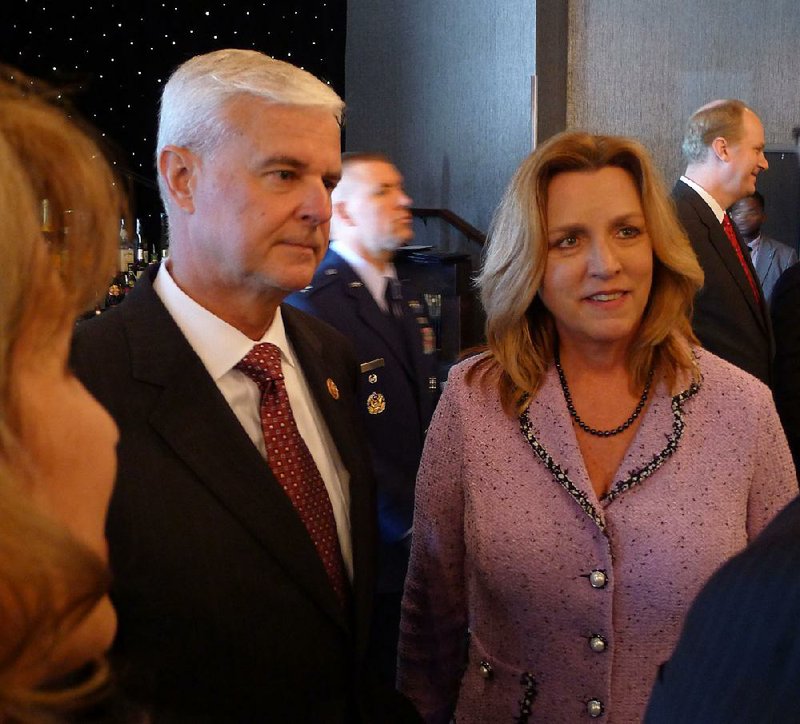For generations, the United States military has fought its wars on land, in the air and on the seas, from the Ardennes forest, to skies over Vietnam to the Persian Gulf. Now the Pentagon is increasingly focused on extending its prowess out to the cosmos, where many believe the wars of the future will be won and lost.
But even as military leaders have taken steps to prepare for conflict in space, some in Congress fear those measures haven't gone far enough. Now, as the Senate debates the Defense Department's spending plan, it is considering how best to hold and defend the ultimate high ground.
Earlier this year, the House took a radical step, proposing the creation of a Space Corps by 2019, a new military branch that would be dedicated to space the way the Navy is to the ocean. The move comes as Russia and China have taken giant leaps in beefing up their national security space systems, officials have said. China has demonstrated the ability to hit a satellite in low Earth orbit with a missile. And it has developed the capability to hit a target in a further orbit, where the United States has many of its most crucial military and spy satellites.
"It is disturbing the rate at which China and Russia are pursuing these capabilities," said Rep. Mike Rogers, R-Ala., at a recent event at the policy-oriented Center for Strategic and International Studies. "We have lost a dramatic lead in space that we should have never let get away from us. So that's what gave us the sense of urgency to get after this."
His proposal, crafted with U.S. Rep. Jim Cooper, D-Tenn., would keep the Space Corps within the Air Force, much as the Marine Corps is a part of the Navy.
But while part of the Air Force, the Space Corps would have its own funding, procurement programs and staff made up of service members trained specifically in space concerns -- creating a potentially lucrative new opportunity for the thriving commercial space industry.
"The Air Force culturally is structured around air dominance. And it should be. It's the Air Force," said Rogers, the chairman of the Armed Services Committee's Strategic Forces Subcommittee. "Problem is space has become so critical to our ability to fight and win wars, it can no longer be a subordinate mission."
The size and scope of the Space Corps would be left up to leaders in the Pentagon. They'd decide how big it would be and what the bureaucracy would look like. They would have a "clean slate from which to start," Rogers said.
Making any change in a bureaucracy as vast as the Pentagon is difficult, especially one that calls for the creation of what would become the first new military service branch since the Air Force was stood up independently from the Army after World War II.
The White House and Defense Secretary Jim Mattis have spoken out against it.
In a letter to Congress, Mattis wrote, according to CNN, "I do not wish to add a separate service that would likely present a narrower and even parochial approach to space operations."
The addition of a new service "would be the biggest change in the Defense Department since 1947," said Todd Harrison, a defense analyst at the Center for Strategic and International Studies. "You're talking a new rank system, new uniforms, a whole new culture."
While the proposal is in the House's version of the Pentagon's spending plan, which was approved over the summer, it is not included in the Senate bill.
And it has attracted some high-profile criticism from within the Pentagon and on Capitol Hill.
In an op-ed piece for the website Defense One, Gen. John Raymond, head of the Air Force Space Command, argued that the steps the service is taking obviate the need for a new branch of the service.
"Our approach is to normalize, elevate and integrate space as a war-fighting domain," he wrote. "It's an approach that's already paying dividends."
Former Air Force Secretary Deborah Lee James said the Air Force has already established a new National Space Defense Center, and it is giving more priority to space matters, including training what she called "space warfighters."
Such disruptive change within the Pentagon would "create enormous upheaval," she said. "Sometimes the juice is not worth the squeeze."
While not embracing a full Space Corps, the Senate version of the Pentagon spending plan calls for a high-level chief information warfare officer who would be responsible for space as well as cyberspace and electronic warfare.
While there may not be support for the House's proposal, the Senate is also pushing to augment the way the Pentagon fights in space.
"This space threat has developed with alarming speed," Sen. John McCain, R-Ariz., the chairman of the Armed Services Committee, wrote in a report.
"Over the next five years, space must be a priority for additional funding to ensure that the United States maintains its space superiority and has the capabilities and capacity to deter and defend our critical space assets."
It's not just missiles taking out satellites that officials are worried about.
Adversaries are also developing technology to "dazzle" the sensors on satellites or jam them. That would leave troops on the ground without ways to communicate.
It could disable guidance mechanisms on weapons or leave intelligence agencies unable to track terrorists on the ground.
"Russia and China want to take our eyes and ears out," Rogers said at the Center for Strategic and International Studies event. "That's what's up there, and that's why they are spending an inordinate amount on space-based capabilities."
And that's why many think that even if the Space Corp proposal doesn't pass this time around, its day will eventually come.
"In 30, 40, 50 years most people agree that we'll eventually need an independent space service," Harrison said.
SundayMonday on 09/17/2017

